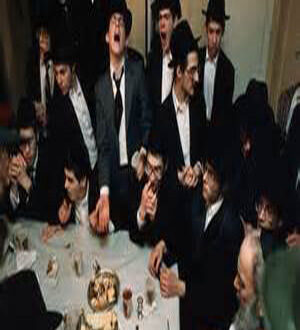Why the leave their homes every year on 13th of the Iranian month of Farwardin?
Purim is a Jewish religious festival and holiday that commemorates the aborting of plan by Haman, royal vizier to King Xerxes I (Khashayar Shah) of Iran, who reigned in the Achaemenid Iranian Empire from 486 to. 465 B.C., to eliminate Mordecai, the famous Jewish Rabbi and the leader of Jews in Iran during the Achaemenid era and his adopted daughter and wife Esther who had risen to become Queen of Iran. The event is recorded in the Judaic Biblical Book of Esther.
The primary source relating to the origin of Purim is the Judaic Biblical Book of Esther, which became the last of the 24 books of the Tanach to be canonized by the Sages of the Great Assembly. It is dated to the fourth century BCE and according to the Talmud was a redaction by the Great Assembly of an original text by Mordecai.
When Cyrus, the famous Emperor of Iran liberated the Jews from the Nebuchadnezzar prisons of Babylon (in modern Iraq) and the Jews with the financial aid of Cyrus, the Emperor of Iran were returned back to Palestine to build their Second Solomon Temple which was destroyed by Nebuchadnezzar. But one-third of the Jews of Babylon instead of returning back to Palestine migrated to Iran and settled in the Iranian kingdom’s domain. Some of the Crypto-Jews who acted to have embraced Zoroastrianism penetrated the royal palace and famous among them was Mordecai, the famous Jewish Rabbi who was a Crypto-Jew but acted as a Zoroastrian and he became very close to King Xerxes I (Khashayar Shah).
The Judaic Biblical Book of Esther states that Vashti, wife of King Xerxes I (Khashayar Shah) and Queen of Iran was killed by his husband in drunken condition in a plan hatched by Mordecai and then Mordecai presented his adopted daughter and wife Esther, whom Mordecai gave her an Iranian name Hadassah, to King Xerxes I (Khashayar Shah) who made her as his wife and Queen of Iran. Mordecai and Esther did not revealed their origins that they were Jews.
According to the Judaic Biblical Book of Esther, Haman, the great royal vizier to King Xerxes I (Khashayar Shah) of Iran came to know about the intrigue of Mordecai and decided to eliminate Mordecai. But his plans were foiled by Mordecai and his adopted daughter Esther who had risen to become Queen of Iran. Instead, Mordecai with help of his adopted daughter and wife Esther could take the orders from the King Xerxes I (Khashayar Shah) by giving him wine and obtained royal decree to execute his faithful able vizier Haman.
The great Iranian vizier Haman was killed along with his ten sons and 77000 Iranian nobles and officials along with their family members were mercilessly massacred by armed militant zealous Iranian Jews on the 13th day of the Hebrew month of Adar which coincides with 13thof the Iranian month of Farwardin. Thus, the 13th day of the Hebrew month of Adar is considered as the sacred “Day of Deliverance” for Jews and this day is the greatest day of feasting and rejoicing for the Jews in the world.
On 13 Adar, Haman along with his ten sons were killed in Shushan and throughout the Iranian empire 77,000 of the Iranians were killed by militant zealot Jews (Esther 9:16). Mordecai assumed the position of second in rank to King Xerxes I (Khashayar Shah) of Iran and he instituted an annual commemoration of Purim on the 13th day of the Hebrew month of Adar as the sacred “Day of Deliverance” for Jews.
The main custom on this most important Jewish religious festival which is known as Purim is to drink wine till one fell down unconscious by excessive wine drinking. Purim is celebrated annually according to the Hebrew calendar on the 14th day of the Hebrew month of Adar and on the 13th day of the Hebrew month of Adar the Jews keep fast. For this reason the digit 13 is sacred for the Jews because this event took place on 13th day of the Hebrew month of Adar.
But digit 13 was a bad omen among Iranians since that event which took place on 13th of the Iranian month of Farwardin when 77,000 Iranians were massacred on this day by the plan executed by Mordecai who became close to King Xerxes I (Khashayar Shah) of Iran by marrying his wife Esther who was also his niece. As per the religious laws of Jews, uncle can marry his brother’s or sister’s daughters. Esther who was the niece of Mordecai was married to him and Mordecai presented his wife Eshter to King Xerxes I (Khashayar Shah) of Iran who by becoming wife of the King of Iran became the Queen of Iran.
Why the Iranians leave their homes every year on 13th of the Iranian month of Farwardin?
After that historical event on the 13th of the Iranian month of Farwardin every year the Iranian fearing of being killed in their homes by militant zealot Jews used to leave their homes every year on 13th of the Iranian month of Farwardin and spend the whole day out of their cities and villages. But the Jews consider the 13th day of the Hebrew month of Adar as the day of great victory for the Jews and they every year celebrate this event as their sacred religious festival.
Mordecai and his adopted daughter and wife Esther are considered as the divine sages of Jews and the Iranian Jews built domes on the graves of Mordecai and his adopted daughter and wife Esther. These tombs are located at the Imam Khomeini (R.A.) Avenue in Western Iranian city of Hamadan. The tombs of Mordecai and his adopted daughter and wife Esther in Hamadan city is visited as the most sacred pilgrimage center by the Iranian Jews and is also considered as the second most sacred site for Jews after the Wailing Wall in Jerusalem. On Purim, Iranian Jews visit the tombs of Esther and Mordecai in Hamadan.
Purim narrative
On the festival day of Purim, the Jews chant the Judaic Biblical Book of Esther. The name of Iranian vizier Haman occurs for 54 times in the Judaic Biblical Book of Esther. During the festival when the name of Haman is read in the Judaic Biblical Book of Esther in the synagogue, which occurs for 54 times, the Jewish congregation engages in noisemaking to curse his name.
Purim festive wine drinking
The drinking of wine features prominently in keeping with the jovial nature of the feast. This is based on the fact that the salvation of the Jews occurred through wine and the Sages of the Talmud made it a religious obligation that one should drink wine on Purim until he can “no longer distinguish between the phrases arur Haman (‘Cursed is Haman’) and baruch Mordechai (‘Blessed is Mordecai’). Thus, the Jews drink excessive wine on this religious festival day while reciting the Judaic Biblical Book of Esther and most of them fall unconscious by the effect of excessive wine drinking.
The custom of masquerading in costume and the wearing of masks is the other religious customs of Jews observed on Purim festival and Haman’s effigy is burnt by the Jews. The Fast of Esther is observed before Purim, on the 13th of Adar.
Jewish communities around the world also celebrate local “Purims” by commemorating the extermination all those who are opposed to Jews like the death anniversary of Nazi Germany ruler Hitler and former Soviet Union ruler Stalin.
In 1960, 20th Century-Fox film “Esther and the King” stars Joan Collins as Esther and Richard Egan as King Xerxes was released. It was filmed in Italy by director Raoul Walsh. In 2006, the movie called “One Night with the King” chronicles the life of the young Jewish girl, Hadassah, who goes on to become the Biblical Esther, the Queen of Iran.
 Mouood Mouood English Edition
Mouood Mouood English Edition




